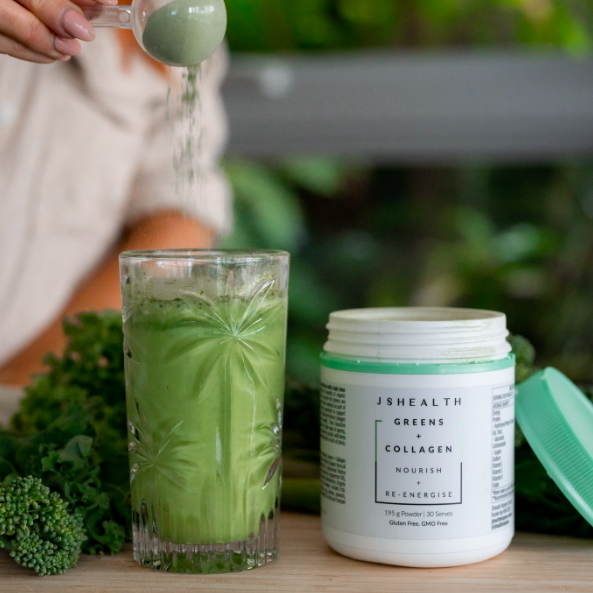
As the temperature drops, more and more of us are reaching for healthy foods, vitamins and supplements to help boost our immune systems and hopefully avoid catching the various colds and flu going around.
But do vitamins and supplements actually work? With so much misinformation floating around the internet and on social media platforms like TikTok, it’s hard to know what’s what.
So we decided to chat with the founder of JSHealth Vitamins, Jessica Sepel, to debunk a few of the common misconceptions about vitamins and supplements and how we work them into our diet.
You get all the vitamins and minerals you need from your diet
While you do get a lot of your much-needed vitamins and minerals from a healthy, balanced diet, there can sometimes be deficiencies because of gaps in your diet or if you have some undiagnosed digestive issues.
“I understand why there have been so many misconceptions about vitamins and supplements,” says Jess. “We are often taught that humans can get all they need (nutrients and minerals) via food. I am still a believer in that, in optimal times. That is why I have always said I see vitamins and supplements as medicines — to address issues at hand when the body needs that extra layer of support above a healthy diet.”
Supplements are exactly that — a way to supplement and bolster your healthy diet, explains Jess. “They are tools that can be used to target specific health concerns and goals, in conjunction with a balanced diet, movement and taking care of the mind.”
Jess encourages people to see their doctors, nutritionists or health professionals to receive a full blood profile test to see where other vitamins or minerals gaps may lie — and then supplement accordingly.
It doesn’t matter when you take vitamins as long as your taking them
Always read the label and directions of use explains Jess. As different supplements should be taken at different times for optimal results.
“The label will guide you. For example, I encourage people to take our Hair + Energy on a full stomach at breakfast time — as zinc on an empty stomach can cause nausea, and iodine can increase energy (which is why it should be taken in the morning). Another example is taking magnesium at night time for better sleep and muscle relaxation.”
Only a small percentage of the vitamins and supplements actually work
According to Jess, when it comes to vitamins and supplements, not all formulas are created equal. Therefore, to get the most out of your vitamins, she recommends choosing higher-quality supplements that use the more bioavailable (read: easier to absorb) forms of ingredients.
Jess also explains that it’s really important to do your research, “In Australia, all formulations must contain an evidence package and research indications to prove the efficacy of their ingredients. The science, therefore, guides the formulations.
“For example, you may find yourself struggling with digestive issues such as constipation or discomfort, and sometimes a probiotic will work brilliantly — above and beyond what food may be able to do.”
Jess explained that the other thing to remember is that not everyone’s body is good at absorbing nutrients and minerals via their food due to things like digestive issues, stress or bad diets — making it hard to achieve the right balance of nutrients and minerals.
“Of course, if someone is presenting with digestive issues, they may not be able to absorb the vitamins and minerals efficiently — which could lead to them not working as well.” This means that supplements might be necessary to fill in the gaps.
“Natural” vitamin supplements are better
“The truth is — companies that care about the evidence, dosing and forms of ingredients are ‘better’ than those who don’t. There are ways of making vitamins and supplements cheaply, and then there are ways of making them with care and quality to be effective.
Do your research on brands before purchasing!”
The more you take, the more effective they are
Nope, if anything, you should simply be taking vitamins and supplements that are specifically tailored to your needs. “I do not encourage people to just take everything. It is much better to use supplements as ‘supplements’ to support the body during times of need.”
For example, we are coming into winter now, and there is no denying that taking an immune formula, a probiotic, and vitamin D can help support an individual’s immune system during the colder months, Jess explains.
“It’s always best for people to check in with their health professional to determine the right supplement regime for them, achieving a tailored approach for individual needs.”
Supplements that target “Hair, Skin and Nails” don’t actually work
“When you’re using supplements for hair and skin with ingredients supported by research and traditional use to actually do what they say, you’ll find that they can really work,” explains Jess. She recommends looking for formulas that are created based on evidence — either traditional use or scientific evidence.
“For example, iodine in the literature has been shown to support hair health and growth (when dietary intake is inadequate), and zinc has been shown to help maintain healthy hair. This is why our best-selling Hair + Energy formula contains these two ingredients. Our much-loved Skin + Digestion formula contains zinc, which the literature shows relieves the symptoms of acne and pimples, along with burdock, traditionally used in Western herbal medicine to relieve minor skin eruptions, as well as relieve symptoms of mild eczema and dermatitis.”
The results we receive from our community with success stories and before/after images truly speak volumes, says Jess.
It’s important to note that you should consult your doctor or health practitioner before you start taking any vitamins or supplements. Especially since some vitamins and supplements can affect any medication you might already be taking.






